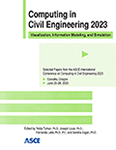Optimization of Stochastic Repetitive Construction Projects: Minimizing Duration Uncertainties
Publication: Computing in Civil Engineering 2023
ABSTRACT
Various studies aimed to optimize the schedules of repetitive projects using line of balance (LOB) via different meta-heuristic optimization techniques. However, most studies considered constant productivity rates to complete activities’ units, disregarding the stochastic nature of the construction methods. This paper aims to minimize the uncertainties of the total project duration in non-serial repetitive projects using non-dominated sorting genetic algorithm II optimization (NSGA II). This is achieved through (1) developing a generic scheduling module for repetitive projects using best practices for LOB, (2) utilizing Monte Carlo simulation to assess the effect of uncertainties of crews’ productivity rates on the total project duration, and (3) implementing NSGA II to optimize the total project duration and minimize the overall standard deviation of the stochastic project schedule. The presented model would thus help planners and decision-makers to define the optimal schedules that decrease the uncertainties in meeting the scheduled project due date, thus decreasing the overall project risk.
Get full access to this article
View all available purchase options and get full access to this chapter.
REFERENCES
Altuwaim, A., and K. El-Rayes. 2018. “Minimizing duration and crew work interruptions of repetitive construction projects.” Autom. Constr., 88: 59–72. https://doi.org/10.1016/j.autcon.2017.12.024.
Ammar, M. A. 2013. “LOB and CPM Integrated Method for Scheduling Repetitive Projects.” J. Constr. Eng. Manag., 139 (1): 44–50. https://doi.org/10.1061/(ASCE)CO.1943-7862.0000569.
Ammar, M. A. 2022. “Optimization of line of balance scheduling considering work interruption.” Int. J. Constr. Manag., 22 (2): 305–316. https://doi.org/10.1080/15623599.2019.1624003.
Ammar, M. A., and A. F. Abdel-Maged. 2018. “Modeling of LOB scheduling with learning development effect.” Int. J. Constr. Manag., 18 (6): 517–526. https://doi.org/10.1080/15623599.2017.1357350.
Arditi, D., O. B. Tokdemir, and K. Suh. 2001. “Effect of learning on line-of-balance scheduling.” Int. J. Proj. Manag., 19 (5): 265–277. https://doi.org/10.1016/S0263-7863(99)00079-4.
Bakry, I., O. Moselhi, and T. Zayed. 2016. “Optimized scheduling and buffering of repetitive construction projects under uncertainty.” Eng. Constr. Archit. Manag., 23 (6): 782–800. https://doi.org/10.1108/ECAM-05-2014-0069.
Couto, J. P., and J. C. Teixeira. 2005. “Using linear model for learning curve effect on highrise floor construction.” Constr. Manag. Econ., 23 (4): 355–364. https://doi.org/10.1080/01446190500040505.
Eid, M. S., E. E. Elbeltagi, and I. H. El-Adaway. 2021. “Simultaneous multi-criteria optimization for scheduling linear infrastructure projects.” Int. J. Constr. Manag., 21 (1): 41–55. https://doi.org/10.1080/15623599.2018.1505027.
Elbeltagi, E., T. Hegazy, and D. Grierson. 2005. “Comparison among five evolutionary-based optimization algorithms.” Adv. Eng. Inform., 19 (1): 43–53. https://doi.org/10.1016/j.aei.2005.01.004.
Hassan, A., K. El-Rayes, and M. Attalla. 2021. “Optimizing the scheduling of crew deployments in repetitive construction projects under uncertainty.” Eng. Constr. Archit. Manag., 28 (6): 1615–1634. https://doi.org/10.1108/ECAM-05-2020-0304.
Hegazy, T., A. Elhakeem, and E. Elbeltagi. 2004. “Distributed Scheduling Model for Infrastructure Networks.” J. Constr. Eng. Manag., 130 (2): 160–167. https://doi.org/10.1061/(ASCE)0733-9364(2004)130:2(160).
Hegazy, T., D. A. Saad, and K. Mostafa. 2020. “Enhanced Repetitive-Scheduling Computation and Visualization.” J. Constr. Eng. Manag., 146 (10): 04020118. https://doi.org/10.1061/(ASCE)CO.1943-7862.0001911.
Hunter, J. D. 2007. “Matplotlib: A 2D Graphics Environment.” Comput. Sci. Eng., 9 (3): 90–95. https://doi.org/10.1109/MCSE.2007.55.
Ioannou, P., and C. Srisuwanrat. 2006. “Sequence Step Algorithm for Continuous Resource Utilization in Probabilistic Repetitive Projects.” Proc. 2006 Winter Simul. Conf., 1731–1740. Monterey, CA, USA: IEEE.
Maravas, A., and J.-P. Pantouvakis. 2011. “Fuzzy Repetitive Scheduling Method for Projects with Repeating Activities.” J. Constr. Eng. Manag., 137 (7): 561–564. https://doi.org/10.1061/(ASCE)CO.1943-7862.0000319.
Ray, P., D. K. Bera, and A. K. Rath. 2021. “Time Cost Optimization Using Genetic Algorithm of a Construction Project.” Recent Dev. Sustain. Infrastruct., Lecture Notes in Civil Engineering, B. B. Das, S. Barbhuiya, R. Gupta, and P. Saha, eds., 909–927. Singapore: Springer Singapore.
Salama, T., and O. Moselhi. 2019. “Multi-objective optimization for repetitive scheduling under uncertainty.” Eng. Constr. Archit. Manag., 26 (7): 1294–1320. https://doi.org/10.1108/ECAM-05-2018-0217.
Srisuwanrat, C., and P. G. Ioannou. 2007. “Optimal scheduling of probabilistic repetitive projects using completed unit and genetic algorithms.” 2007 Winter Simul. Conf., 2151–2158. Washington, DC, USA: IEEE.
Tokdemir, O. B., H. Erol, and I. Dikmen. 2019. “Delay Risk Assessment of Repetitive Construction Projects Using Line-of-Balance Scheduling and Monte Carlo Simulation.” J. Constr. Eng. Manag., 145 (2): 04018132. https://doi.org/10.1061/(ASCE)CO.1943-7862.0001595.
Zou, X., L. Zhang, and Q. Zhang. 2018. “A Biobjective Optimization Model for Deadline Satisfaction in Line-of-Balance Scheduling with Work Interruptions Consideration.” Math. Probl. Eng., 2018: 1–12. https://doi.org/10.1155/2018/6534021.
Information & Authors
Information
Published In
History
Published online: Jan 25, 2024
ASCE Technical Topics:
- Algorithms
- Business management
- Construction engineering
- Construction management
- Construction methods
- Continuum mechanics
- Dynamics (solid mechanics)
- Engineering fundamentals
- Engineering mechanics
- Management methods
- Mathematics
- Methodology (by type)
- Monte Carlo method
- Motion (dynamics)
- Numerical methods
- Personnel management
- Practice and Profession
- Probability
- Productivity
- Project management
- Scheduling
- Solid mechanics
- Stochastic processes
- Uncertainty principles
Authors
Metrics & Citations
Metrics
Citations
Download citation
If you have the appropriate software installed, you can download article citation data to the citation manager of your choice. Simply select your manager software from the list below and click Download.
